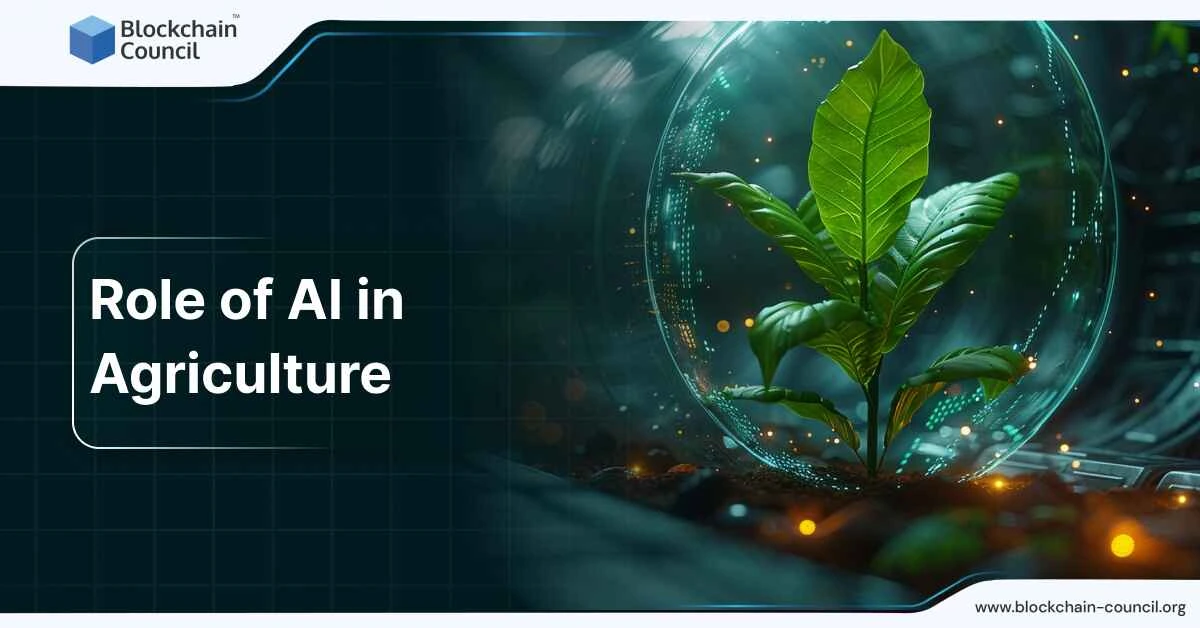
- Blockchain Council
- January 20, 2025
Artificial intelligence (AI) is changing the way farming is done, improving food supply through smarter water usage and weather tracking. By processing large amounts of information, AI helps with efficient water use and quick reactions to climate changes, promoting environmentally friendly farming.
Smarter Ways to Use Water
Older irrigation systems often waste water by spreading it evenly, regardless of different crop requirements. AI solves this by using information to create better watering plans.
Better Water Use
AI tools take input from soil moisture monitors, weather data, and plant health to figure out the best times to water crops. This method gives plants just the right amount of water, reducing waste while boosting production. For example, AI can estimate soil moisture and adjust watering systems to save water and improve crop growth.
Fixing Water System Problems
AI also improves irrigation by detecting problems like leaks, which can lead to wasted water. These systems use sensors to track water flow and pressure, helping farmers fix issues before too much water is lost.
Keeping an Eye on the Weather
Changes in weather patterns can be tough for farmers to handle. AI-powered tools offer helpful information, letting them act early to reduce risks.To know more about AI and its impact on agriculture, consider getting expert-led AI certifications by the Blockchain Council.
Weather Planning
AI studies past weather trends and current satellite data to give detailed forecasts. Farmers can then decide the best times to plant or harvest, avoiding losses from sudden weather changes.
Spotting Pest and Disease Risks
AI can predict when pests or diseases might become a problem by analyzing climate details. This early warning helps farmers protect their crops without overusing chemicals.
Examples of AI in Agriculture
SupPlant’s Advanced Systems
SupPlant uses AI to combine real-time data and farming techniques, helping farmers manage the challenges of climate change. Their tools create stronger, more productive farming systems by improving irrigation and other practices.
Ulangizi: A Helpful Farming Chatbot
In Malawi, a chatbot called Ulangizi provides agricultural advice in the local language, Chichewa. Made by Opportunity International, this tool gives farmers personalized tips, making essential knowledge more accessible.
Challenges Farmers Face
While AI offers plenty of benefits, it isn’t without hurdles. Concerns about data security, the need for high-cost equipment, and proper training for farmers are big issues. Making sure these tools are available to all farmers is vital so that small-scale operations aren’t left behind.
Wrapping Up
AI is making farming more efficient by improving watering techniques and helping farmers handle weather-related challenges. With smarter water use and climate readiness, AI supports environmentally friendly farming. As technology keeps evolving, its role in solving global food supply problems will grow even more significant.





































































 Guides
Guides News
News Blockchain
Blockchain Cryptocurrency
& Digital Assets
Cryptocurrency
& Digital Assets Web3
Web3 Metaverse & NFTs
Metaverse & NFTs
